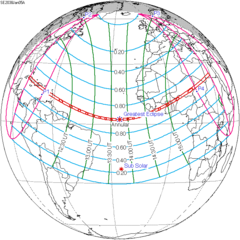December 2028 lunar eclipse
| Total lunar eclipse December 31, 2028 | |
|---|---|
Ecliptic north up The moon passes west to east (right to left) across the Earth's umbral shadow, shown in hourly intervals. | |
| Saros (and member) | 125 (49 of 72) |
| Gamma | 0.3258 |
| Magnitude | 1.2463 |
| Duration (hr:mn:sc) | |
| Totality | 1:11:20 |
| Partial | 3:28:49 |
| Penumbral | 5:36:13 |
| Contacts (UTC) | |
| P1 | 14:03:49 |
| U1 | 15:07:35 |
| U2 | 16:16:19 |
| Greatest | 16:51:58 |
| U3 | 17:27:40 |
| U4 | 18:36:24 |
| P4 | 19:40:02 |
A total lunar eclipse will take place on Sunday, December 31, 2028 (January 1, 2029 for Eastern Asian and Australian timezones). It will occur during a blue moon and is the first such eclipse to happen on New Year's Eve and New Year's Day since December 2009, and the first total lunar eclipse on New Year's Day in history. The next such eclipse will be in December 2047 (though January 2048 for most timezones).
Visibility
[edit]It will be completely visible over Asia and western Australia, will be seen rising over other areas of Africa and Europe, and setting over eastern Australia and New Zealand.
Related lunar eclipses
[edit]Eclipses in 2028
[edit]- A partial lunar eclipse on Wednesday, 12 January 2028.
- An annular solar eclipse on Wednesday, 26 January 2028.
- A partial lunar eclipse on Thursday, 6 July 2028.
- A total solar eclipse on Saturday, 22 July 2028.
- A total lunar eclipse on Sunday, 31 December 2028.
Lunar year series
[edit]| Lunar eclipse series sets from 2027–2031 | ||||||||
|---|---|---|---|---|---|---|---|---|
| Ascending node | Descending node | |||||||
| Saros | Date Viewing |
Type Chart |
Gamma | Saros | Date Viewing |
Type Chart |
Gamma | |
| 110 | 2027 Jul 18
|
Penumbral
|
-1.57589 | 115 | 2028 Jan 12
|
Partial
|
0.98177 | |
| 120 | 2028 Jul 06
|
Partial
|
-0.79040 | 125 | 2028 Dec 31
|
Total
|
0.32583 | |
| 130 | 2029 Jun 26
|
Total
|
0.01240 | 135 | 2029 Dec 20
|
Total
|
-0.38110 | |
| 140 | 2030 Jun 15
|
Partial
|
0.75346 | 145 | 2030 Dec 09
|
Penumbral
|
-1.07315 | |
| 150 | 2031 Jun 05
|
Penumbral
|
1.47322 | |||||
| Last set | 2027 Aug 17 | Last set | 2027 Feb 20 | |||||
| Next set | 2031 May 07 | Next set | 2031 Oct 30 | |||||
Saros series
[edit]Lunar saros series 125, repeating every 18 years and 11 days, has 26 total lunar eclipses. The first was on June 17, 1704 and the last will be on March 19, 2155. The longest totality occurrence of this series (7th) was on August 22, 1812 when totality lasted one hour and 42 minutes.[1]
This is the 19th of 26 total lunar eclipses in series 125. The previous occurrence was on December 21, 2010 and the next will occur on January 12, 2047.
Half-Saros cycle
[edit]A lunar eclipse will be preceded and followed by solar eclipses by 9 years and 5.5 days (a half saros).[2] This lunar eclipse is related to two annular solar eclipses of Solar Saros 132.
| December 26, 2019 | January 5, 2038 |
|---|---|

|

|
Tzolkinex
[edit]- Preceded: Lunar eclipse of November 19, 2021
- Followed: Lunar eclipse of February 11, 2036
See also
[edit]Notes
[edit]- ^ Listing of Eclipses of cycle 125
- ^ Mathematical Astronomy Morsels, Jean Meeus, p.110, Chapter 18, The half-saros
External links
[edit]- 2028 Dec 31 chart: Eclipse Predictions by Fred Espenak, NASA/GSFC




